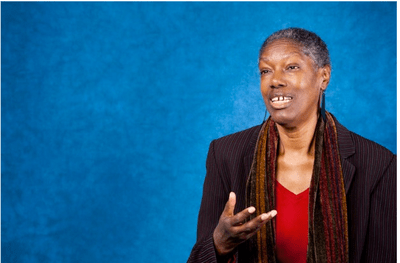Advertisement
Lurching Toward Diabetes: What To Do Before The Sugar Hits

The new one-woman show Sugar, starring Robbie McCauley, breathes life into the sugar trade, slavery, racism and McCauley's own struggle with diabetes.
Diabetes 101
In fact, a colloquial name for diabetes is "sugar"—appropriate, as the disease is characterized by having high levels of sugar in your blood. Nowadays, diabetes often goes hand-in-hand with the word epidemic: 25.8 million Americans are diabetics — about 1 in 8 people (1 in 4 for those 65 or older).
McCauley suffers from the less common form, Type 1 diabetes, which accounts for about 5% of all cases. Her body produces little or no insulin (the hormone that enables sugar in the blood to enter the cells which, in turn, use it for energy). The majority of diabetics in America suffer from Type 2 diabetes, which is when your body doesn't respond correctly to insulin (called insulin resistance) or doesn't produce enough insulin. Type 2 diabetes disproportionately affects African-Americans,
Hispanics, and American Indians. Regardless of the type, diabetes can lead to heart disease, stroke, high blood pressure, eye problems, kidney disease, nervous system damage, and amputations.
Catching It Early
McCauley told the Boston Globe, "My official diagnosis didn't happen until I was in my early 20s, but I realized all my life that something was off in my body."
She brings up a good point about being keyed into hallmark diabetes symptoms. For Type 1, there's not much you can do to avoid the onset of the disease, but there's a little more wiggle room for Type 2. This is hopeful, since the CDC estimates that 79 million Americans have prediabetes (when blood sugar levels are higher than normal, but not yet high enough to be classified as Type 2 diabetes). With these current estimates, roughly 1 in 4 Americans is at risk of developing full-blown Type 2 diabetes in 10 years or less. If you're 45 or older, have a family history of diabetes, are overweight, don't engage in much physical activity, or have other risk factors, you're more likely to be diabetic. But if you know you're prediabetic, there are several things you can do to delay—and even prevent—the onset of disease.
Advertisement
(If you're curious if you're at risk for diabetes, the American Diabetes Association offers an online Type 2 Diabetes Risk Test. You can also ask your doctor about testing your blood sugar.)
A Chance to Take Control
The Diabetes Prevention Program (DPP), a large clinical study of people with prediabetes, showed that lifestyle changes reduced the development of type 2 diabetes by 58%. (It's even more encouraging for those 60 or older; their risk was reduced by 71%.) Study participants ate a diet lower in calories and in fat content and aimed to exercise 150 minutes a week so they could lose 7% of their body weight (which is about 12 pounds for a person that weighs 170 pounds).
A more recent study, done in the predominantly Latino and lower-income city of Lawrence, didn't show such dramatic success as the DPP. But researchers did find that through culturally-tailored messaging and support — like using telenovelas, or Spanish-language soap operas, to talk about healthier food choices — minor weight-loss led to clinically significant blood sugar and insulin improvement among prediabetics.
I know, it's the same ol' advice: eat healthier and exercise more. But with over a quarter of the American population estimated to have prediabetes, it's worth a try.
The power of encouragement shouldn't be underestimated here. You probably know someone who has prediabetes so be sure to throw some emotional support their way. The DPP used intensive one-on-one counseling and group support during the study. It's not just about the actual lifestyle changes; it's also about a nurturing social environment that supports those lifestyle changes and helps maintain them.
Simple Advice, Complicated Solution
A nurturing social environment is one thing, an equitable physical environment is another.
If you live in a food desert, having access to healthy foods to "eat healthier" is about getting on a bus, trekking through the city, and finding someone to take care of the kids while you travel miles to buy healthy food options that might even be out of your budget. If you live in an unsafe neighborhood, the idea of going for a brisk walk at night in order to "exercise more" could be putting you in danger, whether real or imagined. Or maybe working two jobs gives you little time to go to the gym, which may not even be remotely close to where you live.
We're bombarded by advice about healthy eating and exercise, but we also need to lend an ear to the social inequalities that make following that advice far more complicated. To pick up on this side of the conversation, I highly recommend you listen to Radio Boston today. Robbie McCauley from Sugar will be joining them, as will Yvette Cozier from the Boston University School of Public Health.
This program aired on January 17, 2012. The audio for this program is not available.